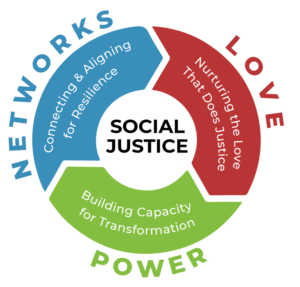IISC facilitates social change and racial equity using our Collaborative Change Lens to shift power dynamics, focus on building networks, and amplify love as a force for social change. We believe that collaborative transformation comes from shifting and building power in ways that challenge the underlying drivers of inequity. Using this lens, leaders can overcome challenges and fundamentally change unjust situations.
Power: Building capacity for transformation
We build capacity to see and change the dynamics of oppression, and to envision new ways of being together. This enables us to guide people toward building shared power to create just and inclusive communities and organizations, where people and the planet can thrive.
“Our radical imagination is a tool for decolonization, for reclaiming our right to shape our lived reality.”
― adrienne maree brown, author, doula, women’s rights activist, black feminist
Pleasure Activism: The Politics of Feeling Good
Networks: Connecting and aligning for resilience
Life and living systems are networks of networks, characterized by critical connections and flows that can determine everything from justice to wellbeing to long-term thriving. Part of working for social change is building connections and alignment and shifting flows of crucial resources among individuals and organizations across boundaries of issue, organization, identity, geography, discipline, and more. The trust, skills, and mindsets that enable these connections and flows are the building blocks for deep and sustainable changes in systems, with respect to relationships, processes, and outcomes. In the face of complex social and ecological issues, such as systemic oppression, climate change, and poverty, single actors are hard pressed to have much impact.
“We never know how our small activities will affect others through the invisible fabric of our connectedness. In this exquisitely connected world, it’s never a question of ‘critical mass.’ It’s always about critical connections.”
― Grace Lee Boggs, author, social activist, philosopher, feminist
“While a network, like a group, is a collection of people, it includes something more: a specific set of connections between people in the group. These ties are often more important than the individual people themselves. They allow groups to do things that a disconnected collection of individuals cannot. The ties explain why the whole is greater than the sum of its parts.”
― Nicholas A. Christakis, sociologist and physician
Love: Nurturing the love that does justice
We nurture the love that does justice: the desire for the wellbeing of others, which is central to every social change movement. Love infuses our power with compassion, reclaims our resilience, heals our wounds, causes us to see ourselves as connected, and enables our radical imagination. In the words of a contemporary movement song, love says “somebody’s hurting my family, and it’s gone on far too long, and we won’t be silent any more!”
““Power without love is reckless and abusive, and love without power is sentimental and anemic.
― Rev. Dr. Martin Luther King, Jr., minister and activist
Power at its best is love implementing the demands of justice, and justice at its best is power correcting everything that stands against love.”
“All awakening to love is spiritual awakening… All the great social movements for freedom and justice in our society have promoted a love ethic.”
― bell hooks, author, professor, feminist, social activist
